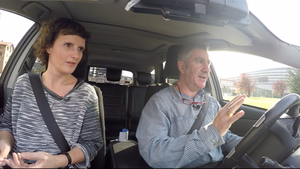Share: A new era of the economy?
2014/06/01 Leturia Azkarate, Igor - Informatikaria eta ikertzailea Iturria: Elhuyar aldizkaria

The acronym P2P represents Peer To Peer, that is, equal to equal, and want to express the sharing or collaboration between equals. P2P systems created about 15 years ago, such as Emule and Bittorrent, allowed file sharing across the network, and now P2P services have been created to share other consumer topics such as sleeping place or car trips. Obviously, these topics cannot be sent by the network as a file, but they help to relate the shared goods of some people to the needs of others.
Sharing everything together
One of the most proliferated services is to share trips by car, called in English travelling. There are many services of this type: Blablacar, Amovens, Circle Ride... Other similar services have also been created, the so-called real-time ridesharing, in which we express a need for travel that we have at the time and takes us in exchange for a particular car network. Examples: Uber, Lyft, Sidecar...
It is also very fashionable to share accommodation for holidays. For the exchange of homes in holiday period there are services called home exchange, such as HomeExchange, HomeForExchange and LoveHomeSwap. Other services are of the type accomodation sharing. In them we house the people in our house in exchange for us to go home to others. BeWelcome and CouchSurfing are of this type. Finally, in our home there are accommodation services for people on vacation, the best known is Airbnb.
Crowdfunding or collective funding can also be considered as a way of sharing. In this case, the financing costs of a product are shared, usually for the final product. Kickstarter and Indiegogo are probably the best known.
And there are services to share or offer many more things: meals (Kitchen-surfing, Cookening, CompartoPlato...), time (TimeBank...) and any other that occurs to us.
Positioning contrary to traditional sectors
These new activities clearly affect economic sectors such as hotels, taxis, public transport, etc. For this reason, in the places where these activities have been most widespread, these sectors have faced each other.
For example, the hotel associations of New York and Amsterdam have requested that the accommodations offered in the Airbnb service be subjected to the same security and tax measures as the hotels and the obtaining of the license, and have done so in Amsterdam. The Lease Law passed in Spain in 2013 leaves in the hands of the Autonomous Communities the regulation of these private rents and its ban is being proposed in Madrid.
Taxi associations have also risen up against the Uber service in many cities, because they consider that the real service and time ridesharing is, in short, very similar to the taxi and the competition is unfair. In France, before using a service in Uber, a 15-minute wait rule was passed which was rejected. In Brussels they don't let Uber work and in Seattle they limit the number of cars.
The protests against Airbnb and Uber are, to some extent, understandable, since there is no real sharing or exchange in them: there are people who let other people use their goods in exchange for money, so it can be considered a lucrative activity. Less is understood the complaint and closure filed by Fenebús, an association of bus companies in Spain, against Blablacar, which allows to share real car trips.
As for Crowdfunding, the law that the Spanish Government proposed for its regulation raised dust on the net by believing it was too restrictive and would kill crowdfunding. The limits to be established for the funds that were made were the following: a maximum of one million euros per project and a maximum of 3,000 euros per project and 6,000 euros per person per year. It is true that this greatly limits the support that large investors can lend to large projects, but in individual projects supported by many individuals (such as actual crowdfunding projects or massive funding) these figures are hardly surpassed.
Many other sectors have also shown their concerns and protests around these economic models of sharing: hospitality, against the distribution of meals, sectors, time banks, etc. But protests and complaints complain, it seems that the sharing economy will continue to grow a lot.

Gai honi buruzko eduki gehiago
Elhuyarrek garatutako teknologia






